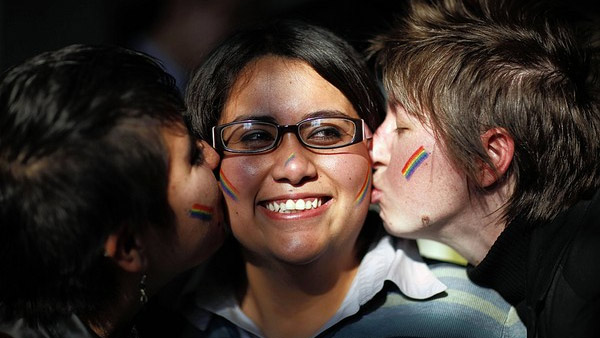
|  |  |  Editorials | Issues | December 2009 Editorials | Issues | December 2009  
Same-Sex Marriage: Chicago Hispanics React to Mexico City's Action
 Serena Maria Daniels - Chicago Tribune Serena Maria Daniels - Chicago Tribune
go to original
December 26, 2009


| | Gay rights activists Nadia Rosso, 23, left, and Denisse Temin, 27, kiss fellow activist Selene Flores, 23 as they celebrate the legalization of same-sex marriage at Mexico City's local assembly, Monday, Dec. 21, 2009. (Alexandre Meneghini/Associated Press) |  |
Chicagoans react with disbelief, hope, pride to the legalization of same-sex marriage in Mexico City; some still see taboo.

Mexico City's pre-Christmas decision to legalize same-sex marriage drew the same mixed reaction in Chicago as it did back in a country widely considered to be dominated by the Catholic Church.

"I think it's a great sign: that no matter what, human rights are what matter," said Noemi Mendoza, 36, who is openly gay and leads the Latino ministry at AChurch4Me? Metropolitan Community Church in Lakeview.

Gilbert Marcano, a Pilsen truck driver, reflected the reality that the subjects of homosexuality and gay rights issues are considered taboo among many Latinos.

"I'm shocked that Mexico City would approve of this," Marcano said. "I personally don't support it, but I also don't think it's right to tell somebody what to do."

Such division was reflected in Mexico City, where the city assembly voted 39-20 last week over the objections of Catholic religious leaders to define marriage as a "free union between two people." The city's mayor, Marcelo Ebrard, is expected to sign the measure into law.

Mexico City, as a rule, is more permissive than much of the rest of the country. Under Ebrard and his Democratic Revolution Party, the city has been at the forefront of changing social policy that's often sharply different from other parts of the country. The city, for example, legalized some abortions in 2007, a decision that has since prompted a backlash in states around the country.

While abortion long has been legal in Illinois, gay marriage is not. A bill to allow civil unions has failed to get out of the General Assembly. In 2005, lawmakers approved a long-stalled measure to explicitly ban discrimination based on sexual orientation and gender identity.

Rick Garcia, director of public policy for Equality Illinois, a gay rights advocacy organization, thinks it's unlikely that Illinois will allow gay marriage any time soon but believes the move in Mexico City is significant.

"The developments in Mexico City lead the way for legislators in Illinois, especially for Latino legislators," Garcia said. "(Some might) say, 'All of my constituents are Mexican Catholic or Polish or Latino Catholic. I can't vote for this.' And, my response is, 'Yes you can.' Their responsibility is not to codify into law the teachings of the Roman Catholic Church. Their responsibility is to promote the common good for everyone."

Mexico City also legalized adoption by same sex couples, something that's already legal in Illinois.

Javier Haro, 33, a Pilsen restaurant consultant, said he always found it hard to visualize a same sex couple raising a child together until his cousin, who is gay, began interacting with their young nieces and nephews.

"It's hit home for me. I have family members who have not come out," Haro said. "Because of our culture, it's difficult to talk about."

Haro said that when he was growing up, men were expected to be masculine and that mothers were housewives. As he grows older, he said he likes the hybrid of roles that men and women share.

"What it boils down to is whether a couple can instill family values," Haro said.

Gay marriage is being hotly debated in some parts of predominantly Catholic Latin America. Uruguay was the first country in the region to recognize same-sex unions.

In the U.S., the District of Columbia has approved gay marriage legislation that requires a congressional period of review before it can go into effect. If the bill becomes law, the district will join Connecticut, Iowa, Massachusetts and Vermont in issuing marriage licenses to same-sex couples. They will be able to wed in New Hampshire starting in January.

The evolution in attitude on gay marriage has been heartening to Mendoza, who kept her sexuality a secret early in her career but now counsels people who are coming to terms with being rejected for coming out as gay or lesbian.

"Mexico has changed a lot, just like here in Chicago. We have a gay neighborhood, Mexico City has a gay neighborhood too," Mendoza said. "You can feel it in Mexico City when you see gay couples holding hands."

sedaniels(at)tribune.com |

 |
|  |



